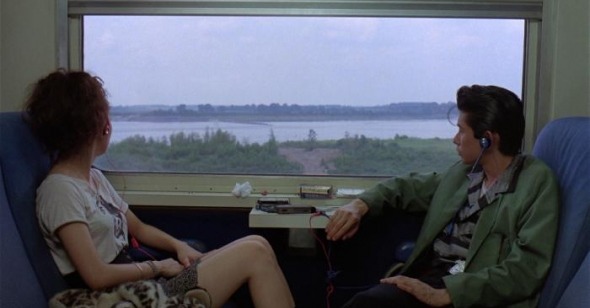The King and I
Suzanne Scott on Mystery Train
Empty streets littered with broken-down pick-up trucks, vacant lots clogged with overgrown weeds, interiors notable only for their peeling wallpaper and dingy textiles, landmarks that hardly appear to be worth marking to the naked eye—this is Jim Jarmusch’s Memphis, a ghost town where the residence of its most notable ghost, the gloriously gaudy Graceland, always looms offscreen, unreachable by the lowdown inhabitants of Mystery Train. Elvis Aaron Presley permeates each filmic short story in Jarmusch’s overlapping triad, sometimes directly, other times indirectly, but his presence is far more than simple connective tissue. In a film that ruminates on the status of the Other in American society (whether they be Japanese tourists, an Italian stranded for a lone night, or a British immigrant dissatisfied with the American dream), Elvis is the ultimate accepted Other, concurrently revered for his difference and claimed as our own. As Elvis is framed as an idol, a specter and a doppelganger in turn, his rule over the Memphis outside of Graceland’s gates (and America at large) is examined in subtle and often bittersweet detail by Jarmusch until at last the myth is secondary to our interaction with that myth and how those interactions form our identity.
Just as Graceland stands as a solitary diamond in the surrounding urban rough, Jarmusch punctuates dingy landscapes and low-class signifiers with dazzling flashes of red—a suitcase, a smear of lipstick, a pimp-worthy three-piece suit, and so on—giving the impression of a failed attempt to grab a bit of Elvis’s glamour and try it on for size, only to inevitably discover that it looks cartoonish out of context. Elvis’s very aesthetic—the greaser pompadour, the Southern drawl—peppers Jarmusch’s otherwise sparse frames, painting and pictures often hanging as defacto crucifixes on the walls, looking down on the film’s characters with doleful, doting eyes. Even staring up from a scrapbook of American iconography cobbled together by a Japanese tourist, juxtaposed side by side with the likes of Madonna and the Statue of Liberty, Elvis remains a phenomenon rather than a person.
“Why is he fucking everywhere?” gripes one Memphis resident, and it’s easy to understand the continual tug and shove of attraction and repulsion that Jarmusch’s characters have with the King, humble peasants that they are in his exclusionary kingdom of immortal celebrity. For a Japanese couple, one a giddy fan and the other a disaffected detractor who prefers Carl Perkins, Elvis is both a point of contention and a symbol of an America that only exists as a detached legend. For an Italian woman, Elvis is a capitalist tool employed by greedy hucksters looking to exploit a legacy. And for a Brit who’s been dubbed “Elvis” by his American cohorts, he’s a constant reminder of his own failures. The irony and brilliance of the film resides in the fact that Elvis is used as a godly mirror to reflect these exquisitely detailed, often entirely banal, portraits of humanity. Interesting that the film (and Memphis, for that matter, to this day) preserve Elvis in his full glory, allowing history and time to polish away any smudges on his character, his decline never spoken of or documented. Mystery Train, conversely, is concerned with the rise after the fall, focused on those scraping and struggling not for greatness or fame but merely the ability to function, to relate, to survive.
That these outsiders all come to inhabit the various rooms of the same decrepit motel over the course of the same night, each accompanied in spirit by the King, somehow inspires a sense of comfort and unwitting camaraderie even as the personal stories that are called forth are fraught with melancholy, missed opportunities, and unrealized potential. These are undeniably small lives that fascinate Jarmusch, who staunchly refuses to move his camera unless out of absolute necessity, a tourist in his own right. Gazing upon these characters in open fascination, lingering over their faces as one might stare, strangely lured in, to a sofa or toaster oven at Graceland, Jarmusch imbues each of these seemingly below average specimens with an aura of specialness, knowing full well that these particular ghosts will not be remembered past the film’s final frame, not be told in stories, not adorn knick-knacks in gift shops, not be memorialized in the American subconscious on a near daily basis. They are, in short, us, though they are far enough removed that they allow us to see ourselves and our connection to our idols, our culture, with startling clarity and absolute honesty.
It’s fitting that the motif that links these three tales of drifters and outsiders is a trio of radios emitting the most ghostly lament song of Elvis’s anthology, “Blue Moon.” It is ostensibly a song about loneliness, a longing for connection; as the titular train pulls one last time from the station at the film’s conclusion, one can’t help but see Memphis as a sort of weigh station for lost souls. Limbo for some, purgatory for others, and permanent residence to one lonely ghost who was never quite tangible to begin with.
